The World Evangelical Fellowship (WEF) has opened the way for the restoration of unity in its association of 56 national and continent-wide fellowships and alliances. It did so by adopting a major statement setting forth its evangelical distinctions as over against Roman Catholicism. The action came at WEF’s Eighth General Assembly, held earlier this summer in Singapore.
About 230 people from 61 countries attended the meeting of the 25-year-old body, which has held a general assembly every six years since 1956. WEF’s unity was threatened at its 1980 meeting in Hoddesdon, England, after which the Italian Evangelical Alliance (IEA) withdrew from the world association and the Spanish Evangelical Alliance put its membership into “abeyance.”
Both delegations were disturbed by the presence at the 1980 assembly of two Roman Catholic observers and by what IEA President Elio Milazzo referred to as “a tendency prevailing in WEF to relate to Roman Catholicism in an uncritical way.”
The WEF Theological Commission responded by creating an Ecumenical Issues Task Force with the assignment of drafting a statement of evangelical stance toward Roman Catholicism that all member bodies of the fellowship could endorse. With three members each appointed from Italy and Spain, the task force was weighted to give adequate attention to their grievances.
The result was a 38-page document titled “A Contemporary Evangelical Perspective on Roman Catholicism,” which was approved overwhelmingly in Singapore. The statement addressed nine areas of Roman Catholic doctrine and practice, including papal infallibility, justification by faith, and the Catholic church’s view of Mary.
The document notes favorable trends in Roman Catholicism, including a greater emphasis on the authority of the Bible, as opposed to tradition. It acknowledges that “often we have also set our evangelical traditions above Scripture.” But the document’s thrust is that “obstacles in Roman Catholicism … seriously impede fellowship and cooperation [with] Evangelicals.” These obstacles, the statement reads, “are insurmountable as long as there is not fundamental reformation according to the Word of God in the Church of Rome.”
Representatives from Italy and Spain were especially pleased with the statement. WEF leaders said this year’s general assembly was characterized by a greater sense of unity than ever before. “In past general assemblies, [there] has been bickering and debates, much like the United Nations,” said John Langlois, treasurer of WEF’s executive council. “This week … we have seen spiritual unity in action.”
This year’s meeting was also seen as representing a broader, more international constituency. General director David Howard observed that for most of its life, WEF has been perceived as a Western organization. Howard said, “This general assembly has helped people to realize that we are an international organization; that we do represent evangelicals … around the world.”
WEF executive council chairman Tokunboh Adeyemo said one of his goals over the next six years is continuing the internationalization of WEF. “We are moving out of a North American mentality and turning it back to what it is [supposed to be], namely an international body,” said Adeyemo, who also serves as general secretary of the Association of Evangelicals of Africa and Madagascar.
Adeyemo said more decisions are being made on the grassroots level by the international community, rather than by the general director, who from WEF’s beginning has been a Westerner. He pointed to the international nature of the group’s executive council, the group’s main decision-making body. Its representation is distributed among nine regions, with only three—a Canadian, a West German, and a New Zealander—representing the “West.”
In other actions, the general assembly:
• Recommended that all delegates request from their associations a commitment of at least 2 percent of their general fund annual income to WEF. Howard reported the organization continues to face financial difficulty. About two-thirds of the organizations have not paid the annual $75 membership fee in the last year, according to Harry Genet, WEF communications director. He said the primary reasons were the lack of a consistent collection procedure and the organization’s uncertainty as to whether to make the fee mandatory.
• Sent greetings to evangelical church leaders in the Philippines and Haiti, and pledged to continue to pray for them and their governments.
• Sent greetings to evangelical church leaders in South Africa, expressing “sympathy and fellowship in their struggle to witness faithfully to biblical standards of justice and integrity.…” The assembly rejected the violent abuse of power and invited member bodies to make their concern known and to pray for South Africa.
• Called on the government of Vietnam to release 17 pastors known to be imprisoned as “enemies of the people.”
• Noted “with pleasure” the recent acquittal of three evangelicals charged with proselytism in Greece, but appealed to the Greek government to abolish laws on proselytism enacted during the Metaxas regime in the 1930s.
• Announced that Transformation, a publication of the Theological Commission, had been asked by the executive council to find another publisher. Calling it a “vitally important journal,” general director Howard said Transformation was making a major contribution to Christian and social ethics, but stated that “a journal of dialogue of this nature would best be published independently, not related directly to an organization such as WEF.”
By Sharon E. Mumper in Singapore.










